Sangla*
Principal, Kabesa Central School, Punakha, Bhutan
*Corresponding Author: Sangla, Principal, Kabesa Central School, Punakha, Bhutan.
Received: September 01, 2021; Published: October 11, 2021
Citation: Sangla. “An Embedded Case Study on the Roles of School Principals”. Acta Scientific Paediatrics 4.11 (2021): 09-17.
Education is the most important tool which helps youth to lead healthy and fulfilling career. It is one area governments all over the world focus to have a happier and prosperous nation all times to come. To provide quality education there should be a school with a good policy, a good learning environment, good facilities, motivated staff, and so on. To have these conditions, it is vital to have good leadership. Principals in the school play an important role in the functioning and managing of the school effectively.
On the contrary, the quality of education in Bhutan is questioned as never before. Schools of Bhutan came under public scrutiny where the quality of education is being questioned as never before. In such a situation each stakeholder blames the other for the deterioration of quality. In school, teachers blame poor leadership and principals blame the quality of teachers for the same. Considering such an issue, the topic was chosen to study how leadership roles impact teachers’ performance in schools.
A qualitative research design was used to find out attributes of principals in selected schools in Thimphu where most senior and qualified principals manage the schools. For this study, an in-depth study was conducted for two schools from Thimphu Dzongkhags by interviewing three teachers from each school. To cover more schools and to make the result more comprehensive, three aspiring vice-principals to become principals in future were also interviewed based on the interview questionnaire prepared. A semi-structured interview schedule was used based on the study’s research questions. Data generated from the interview questions concerning professional capability were analyzed and thematically coded by the researcher.
Through this study, the researcher provided insights and implications for school principals which would greatly help principals to run effectively on refraining from the exhibition of such qualities.
Keywords: Quality; Education; Principal; Roles; Schools; Teachers
Education is the most important tool which helps youth to lead healthy and fulfilling careers. It is one area governments all over the world focus to have a happier and prosperous nation all times to come. Considering this, a huge amount of money is spent on providing quality education. Western education in Bhutan was started in 1914 by the first king, Gongsar Ugyen Wangchuk to acquire knowledge for administrative purposes and to gain access to the world. It has evolved so fast since then. Today the main purposes are to acquire new knowledge, the latest skills and the building of moral and ethical values [1]. He has also stated that school is the place for the preparation of good and intelligent future citizens based on traditional virtue and social harmony or else, the laughter of today will bring tears in future.
To provide quality education there should be a school with a good policy, a good learning environment, good facilities, motivated staff, and so on. To have these conditions, it is vital to have good leadership. It was rightly stated by Wilkey [2] that it is crucial to put more effort into selecting, recruiting, training, and developing effective high school principals for providing quality education. In the same line, Pinheiro [3] stated that leadership plays a crucial role in successfully carrying out any program in the schools. He or she has to be knowledgeable and inspiring to followers. Kottke and Pelletier [4] stated that when an immediate supervisor fails to lead others with qualities of leadership, he or she loses control over running the organization result in failure to achieve organizational goals.
The quality of education in Bhutan is questioned as never before. As per Tashi [5] schools came under public scrutiny where the quality of education is being questioned as never before. In such a situation each stakeholder blames the other for the deterioration of quality. In school, teachers blame poor leadership and principals blame the quality of teachers for the same.
Considering such an issue, the topic was chosen to study how leadership roles impact teachers’ performance in schools.
The purpose of the study was to assess the qualities of school principals by using qualitative studies. The main technique used was a case study involving two schools with three participants from each school and three vice principals aspiring to become principals in future.
A qualitative study requires an investigator to derive research questions that will explore the meaning of the experience of individuals and ask them to describe their everyday life experiences [6]. This, according to him, is done through interviews with individuals who have experienced the phenomenon.
For this study, an in-depth study was conducted for two schools from Thimphu Dzongkhags by interviewing three teachers from each school. To cover more schools and to make the result more comprehensive, three aspiring vice-principals to become principals in future were also interviewed based on a questionnaire prepared.
The structured open-ended questionnaires were prepared in advance and pre-tested before the conduct of the interview. The data was collected through face to face interviews despite a lot of challenges faced. The relevant articles were read to support the findings.
The face to face interviews was conducted by making prior appointments with concerned participants. The questionnaires developed were pre-tested in advance to check reliability. The questions were clearly explained to participants before getting responses. Having assured confidentiality, most participants were very candid in sharing facts about their principals which would help to enhance qualities as per the desire of the followers and appropriate to the situation. In case of doubts and unclear responses, clarifications were sought through We-Chat and phone calls.
The term validity refers to ascertain whether the research method used measures what the researcher has intended it to measure and reliability refer to the stability of the measure (Ghauri and Grønhaug, 2005). The steps stated below were followed to get indented result:
Two schools from Thimphu and three vice-principals from different schools were selected for this research work. The two selected schools were Lower Secondary and Middle Secondary School from Thimphu Dzongkhag. From each school, three participants were interviewed by using purposive or judgmental techniques as stated below.
Three senior staff with more than three years of working experience in the same school were requested for an interview to get the most reliable information. To get such participants, support from various stakeholders was sought. The option to speak through the phone was also given which helped the interviewer to help the most reliable data [7-24].
From total respondents, all vice principals interviewed were age between 35 to 40 years. 66% of Lower Secondary teachers fall below 35 years of age and 33% between 33 - 40 years. Most Middle Secondary School teachers fall above 40 years with 66.7% and only 33.3% fall between 35 - 40 years.
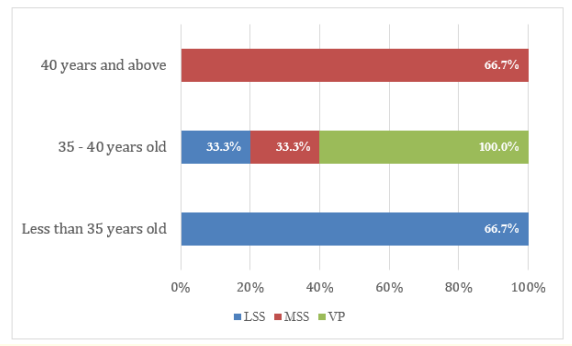
Figure 1: Respondents by age.
The diagram below shows most teachers interviewed were female. It is because most of the schools in Thimphu are female teacher dominated schools.
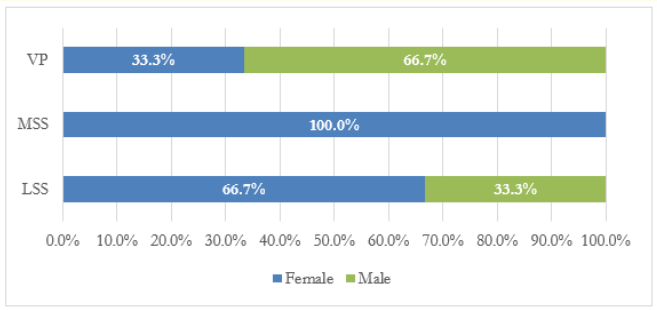
Figure 2: Respondents by school level by gender.
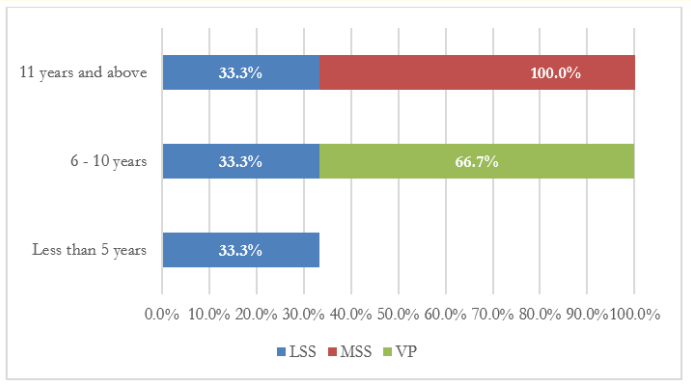
Figure 3: Respondents by experience.
Each response was converted into appropriate codes for which different numbers were assigned. As proposed excel tools were used to derive results as shown below. Each diagram as reflected below is briefly interpreted under the appropriate theme developed.
All respondents responded that they developed their schools’ vision and a mission involving all staff and decisions taken based on majority support. They were expressing that such culture helped everyone to work with a sense of responsibility.
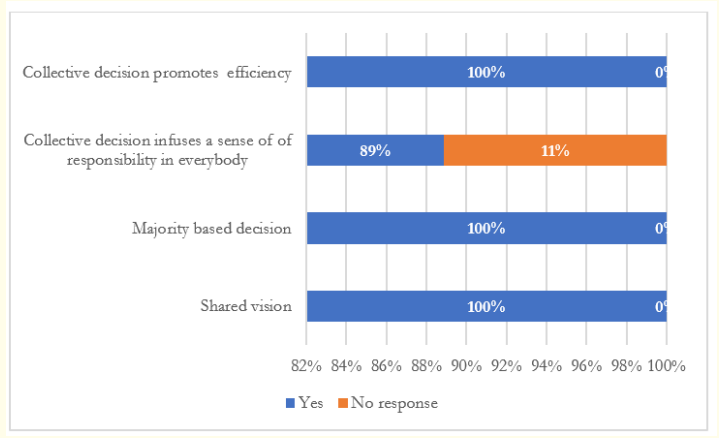
Figure 4: Collaborative culture.
All respondents received more than two roles to carry out in the school but 78% felt delegation took place without proper criteria against only 22% who felt that roles were assigned with proper criteria. 33% shared that they were given roles directly by school management without considering their capability and interest. Selecting staff as their representative was another area they felt was not fair. 56% shared that they have selected staff for key roles like the school management team through the raise of hands on the nomination given by school management. 68% of them were of the view that it is important to have fair work distribution with strong criteria set in future.
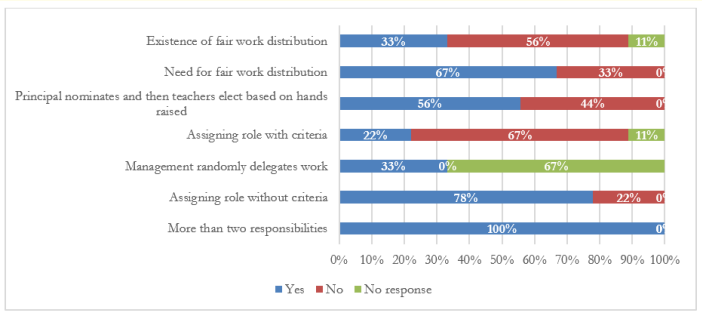
Figure 5: Job delegation.
Most respondents were not happy with the way the delegation was done. Teachers from Lower Secondary School were ones who have the feeling that they should be given the option to choose as per their interest and capabilities. On the contrary, most vice-principals expressed that it is important to delegate roles and responsibilities as per criteria set in advance. The conclusion that we can draw from the diagram below is that all respondents have the feeling that roles and responsibilities needed to be distributed among staff equally based on individual’s option and capability.
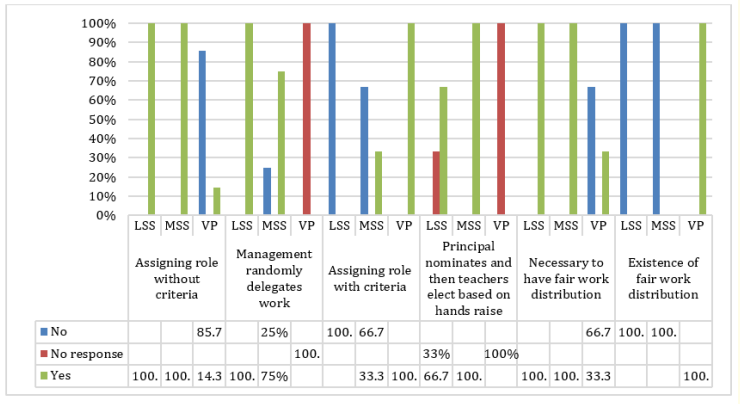
Figure 6: Delegation of roles and responsibilities by type of schools.
The figure shows how schools celebrated the success and hard work of students and teachers to inspire and motivate further. In general, reinforcement techniques such as celebrating the success of both students and teachers were poor with 44% for students and only 11% for teachers. Likewise, only 22% reported that they have adequate teaching-learning resources to make teaching effective and 78% expressed that they did not get enough resources to improve their teaching. While there was no response from 78% of respondents, 22% shared that principals must assign responsibilities not only to work but also to make a decision. Likewise, 11% suggested avoiding focusing too much on non-academic activities which hampered the teaching period.
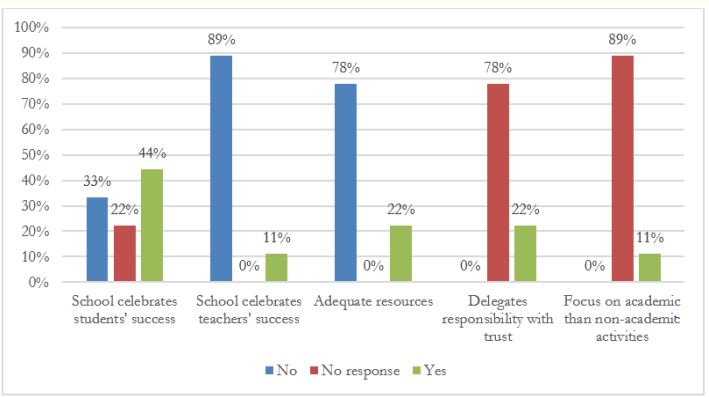
Figure 7: Reinforcement.
The reinforcement used to encourage varies greatly from 75% by Middle Secondary School Principals to zero per cent by LSS principals. Most teachers of LSS said that their principal leadership role in performing activities but rarely acknowledge them. When all vice principals responded by saying that their principal performed an excellent job in providing resources and reinforcement, teachers in LSS and MSS reported otherwise. Vice principals also shared that principal must assign tasks to other with trust to enable them to perform better. Few teachers of MSS also made a very interesting suggestion by saying that principals focus more on academic activities than non-academic activities.
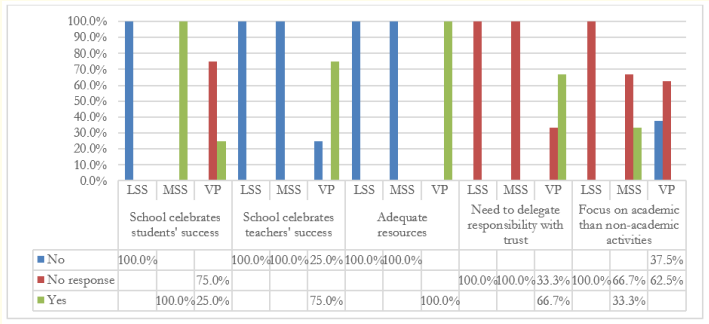
Figure 8: Reinforcement by type of schools.
Respondents views regarding relationship-building among staff and encouraging teachers to express their views and suggestions were positive with 67% saying that principals took initiative to promote. However, 56% reported that principals were failing to carry out effective monitoring in the school. Failure to stop those who evade duty further discourages teachers who work hard in the school.
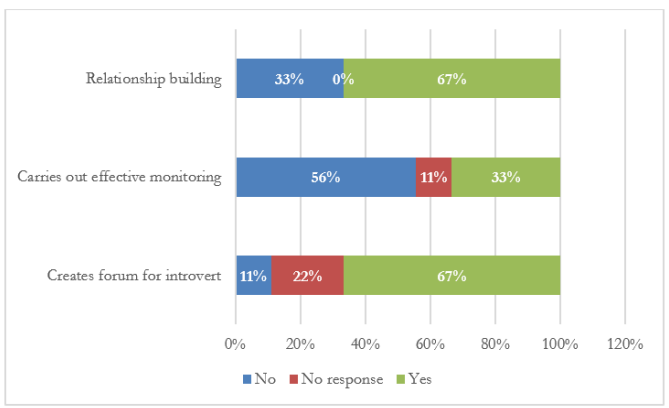
Figure 9: Supportive role of principal.
While all respondents have the same view about their principals helping teachers to open up for gaining confidence and to promote interaction, the view varies concerning monitoring by the principal. All teachers from MSS said that management needs to carry out effective monitoring to stop teachers from evading their duty. Rests of the teachers also haven’t said that they have an effective monitoring system in place. While it is not a big issue with LSS teachers and Vice principals, teachers in middle secondary school suggested schools to introduce more activities to promote interaction among teachers.
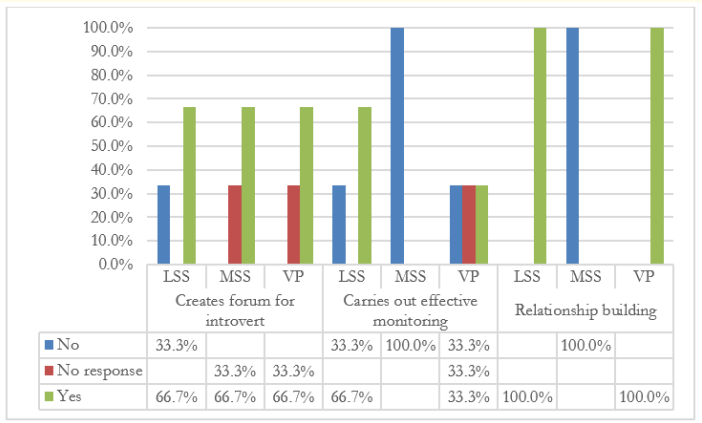
Figure 10: Supportive role of principal by type of schools.
All respondents expressed that fair treatment by the principal is quite important but 67% of respondents felt that principals failed to promote fairness. The fact was that 78% felt that close associates of principal influenced decision making. Few teachers also raised the issue that they were given unfair performance ratings without giving any opportunity to justify their stand.
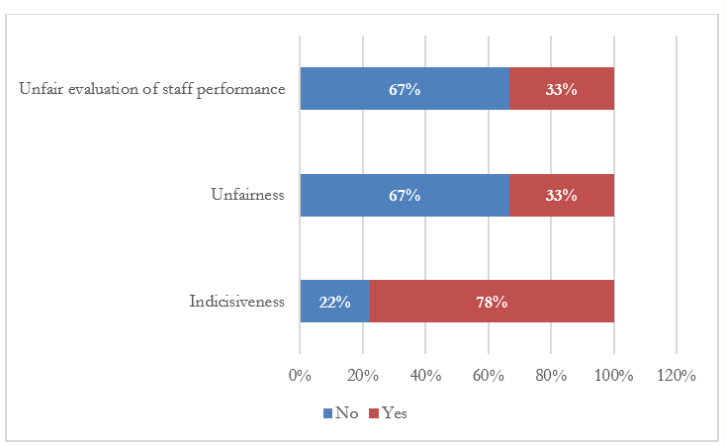
Figure 11: Treatment with fairness.
The graph below clearly shows that most of the respondents expressed that their principals were indecisive. They have the feeling that staff close to the principal impact the principal’s decision making which sometimes upset others. Such situations they feel lead to unfair treatment. All LSS teachers felt that they were treated unfairly because they were given annual performance ratings without considering their hard work and denied an opportunity to justify their stand.
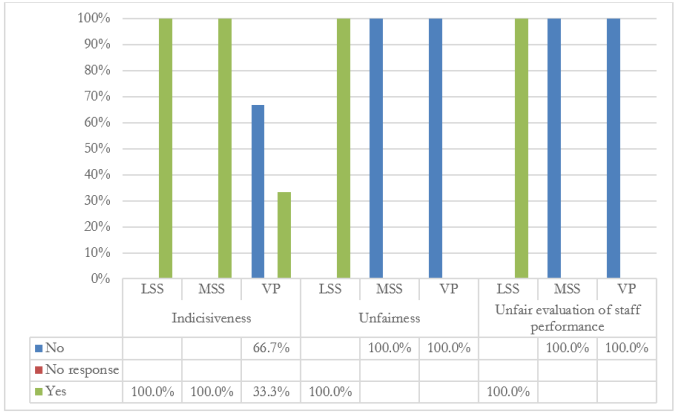
Figure 12: Treatment with fairness by type of schools.
Most respondents reported that their principals make use of effective communication to introduce change in school. Professional development is the best example where principals with other experts teach 21st-century teaching pedagogy to replace old methods. However, the research culture among teachers seems to be poor with 77.8% of respondents saying that they don’t carry out research work. Only 22.2% responded that they do some form of research work.
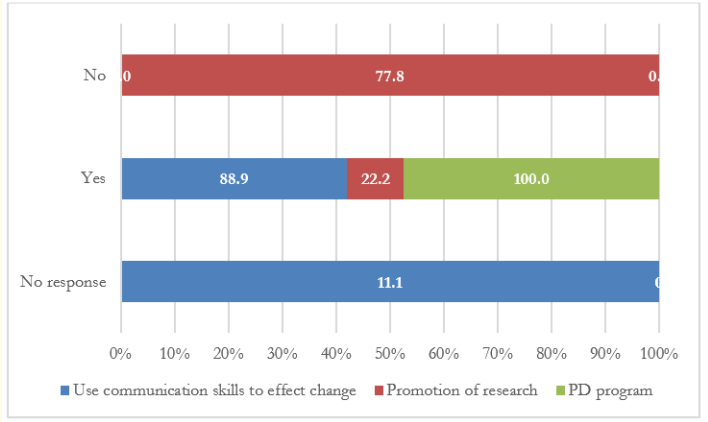
Figure 13: Change management.
The response related to change management, research culture and Professional development program also vary. While most responses indicated that change is affected by their principals through effective communication, research culture exist only in schools where vice-principals worked. They have shared that principals have good knowledge in carrying out research work because of which others got encouraged. On the other hand, it is not prevalent in two other schools. Lack of time was the factor that they have cited.
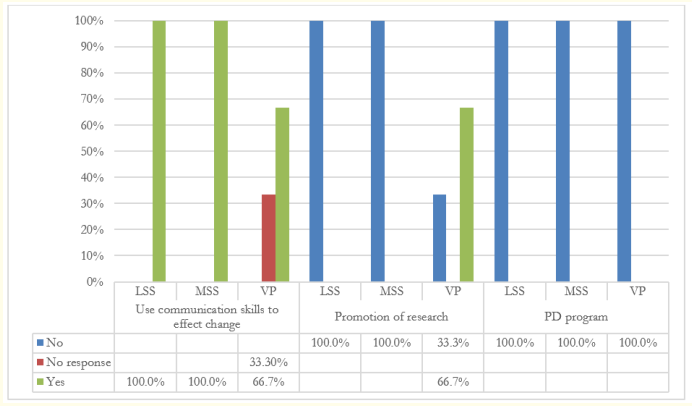
Figure 14: Change management by type of schools.
This diagram indicates the teacher's views expressed with regards to schools’ good practices, good qualities of principals and suggestions for future improvement.
67% of respondents reported that schools have very strong welfare policies for both students and teachers. Through such policy students and teachers who meet serious problems such as a death in the family receive support in terms of financial and emotional need. Analyzing students results and taking remedial programs after each test worked well and promoted a sense of competition among both teachers and students accounts 56%. 33% responded that they have a system to conduct meeting with parents one section a day to ensure intensive discussion with each parent.
The principals’ qualities such as leading by example (33%), punctuality (67%) and principal remaining all the time in the school (33%) are attributes teachers believed as good and inspire them to work harder.
When teachers were asked to provide suggestions that would help their principal to improve, one vice principal shared his principal need to avoid intimate relationships especially with female staff, 33% of respondents shared their principal need to pay more attention to team building, need to pay equal attention to all classes instead of focusing on classes which have national level examination (33%), important to know names of all staff (33%) and avoid getting influence by close associates in decision making (67%) were suggestions for principals to take necessary action. Considering total respondents and the number of no responses, it is important to treat all suggestions as very important.
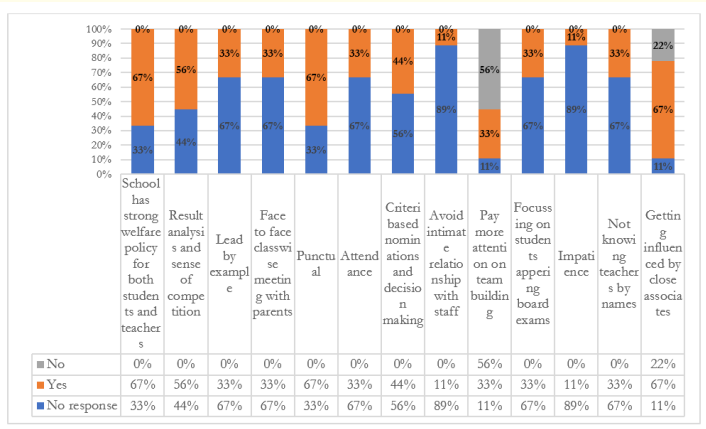
Figure 15: Prevalence of good practices.
On the whole, LSS and MSS teachers have more good practice to share than schools in which vice-principals were working. Good practices such as a strong welfare policy, providing efficient remedial classes after each test, conducting a meeting with parents based on class level and section, leading by example and remaining most of the time in school by the principal are good practices shared by LSS teachers about their school. The few issues the principal need to pay immediate attention to are initiating face to face performance rating which is a must as per government policy. The other points which seem to be minor but have a huge impact on teachers are the need to know the names of each teacher, distributing roles based on criteria and being decisive in decision making.
The culture of result analysis, very strong welfare policy for both students and teachers and principal being very punctual in for any program and activity are very important qualities of MSS Principal.
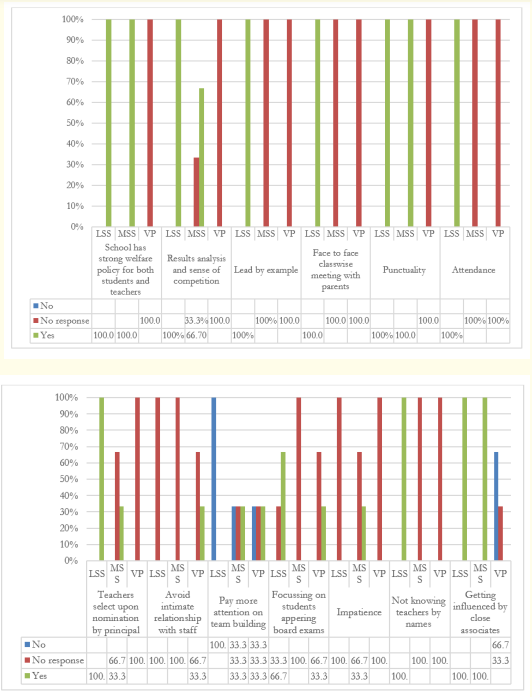
Figure 16: Prevalence of good practices by type of schools.
As intended, the study provided a lot of insight into how principal’s qualities affect teacher’s performance in the school. Such findings became possible mainly because all participants were made very clear about ethical issues and assured total confidentiality concerning their identity. To keep up with good practices and to overcome bad practices, the researcher would like to make the following recommendation:
The introduction of such a system and culture would greatly benefit children in getting quality education in future.
The study has greatly helped in enriching leadership knowledge about effective school principals.
One very clear thing is that any aspiring principals and serving principals needs to know the qualities of effective principals and their impact on followers’ performance.
The way the leaders speak, display conduct and treat followers are very closely observed by followers. The use or display of even small negative quality is taken by followers as bad and starts not only distrusting his or her leader but also brings down his or her interest towards duty. The existence of such a situation creates a ripple effect on others affecting service receivers ultimately. For this reason, Koter (1995) stated that failure in an organization happens mainly because of incapable leadership.
Considering the fact shared by Kotter and the more important lesson learned from the responses made by participants of this research, any leader must display qualities such as leading by example, providing support in times of difficulty, acknowledging hard work, creating a good environment to work etc.
The responses received both positive and negative would go a long way in enhancing school leadership which has a direct relationship with students’ performance.
Copyright: © 2021 Sangla. This is an open-access article distributed under the terms of the Creative Commons Attribution License, which permits unrestricted use, distribution, and reproduction in any medium, provided the original author and source are credited.
ff
© 2024 Acta Scientific, All rights reserved.